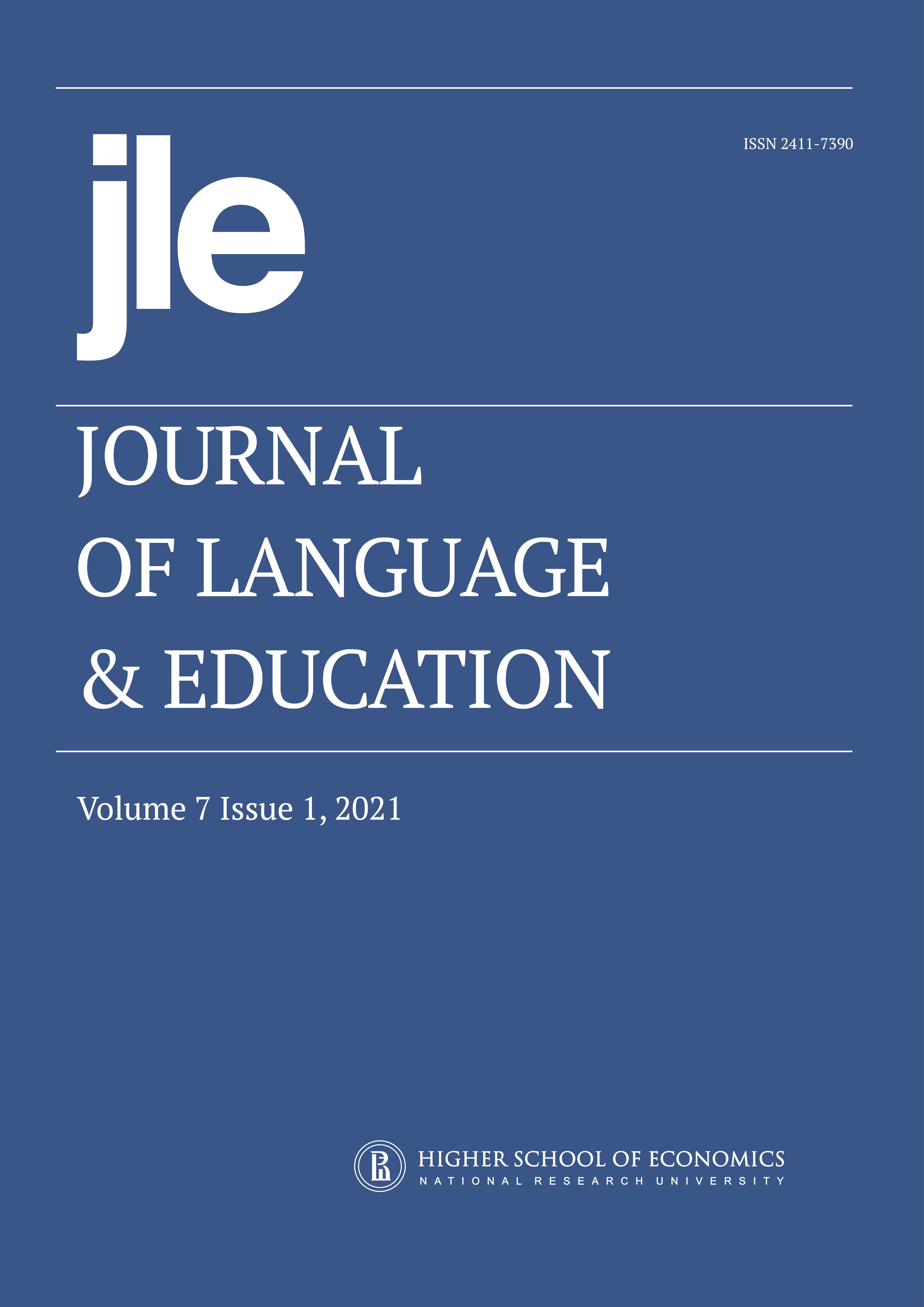Как стать исследователем английского языка как иностранного: личный монолог
Аннотация
В данной аналитической статье рассказывается о моем пути от наивного исследователя к критику и от бихевиориста к постструктуралисту. В ней освещаются различные философские, методологические и теоретические дилеммы, с которыми я столкнулся во время обучения в аспирантуре при осмыслении опыта студентов, обучающихся по программе "Английский язык как иностранный" в вузе. Этот путь делится на три этапа: конструирование, деконструкция и реконструкция. На этапе конструирования я описывал опыт студентов, опираясь на свои собственные знания, которые были основаны на моих предположениях о преподавании и обучении. На этапе деконструкции я подверг сомнению свое понимание знаний и социальных реалий. На этапе реконструкции я прибег к феноменографии, теории деятельности, символическому интеракционизму, сообществу практики и структурализму Бурдьё. Я привожу свои изыскания в данной статье, фокусируясь в основном на дилеммах, возникших у меня как у исследователя. Эти размышления могут быть очень полезны для начинающих исследователей, которые могут столкнуться с подобными ситуациями на разных этапах своей научной карьеры.
Скачивания
Литература
Ahmed, I. (2012). Investigating students' experiences of learning English as a second language at the University of Sindh, Jamshoro, Pakistan. The Sindh University Journal of Education-SUJE, 45(1), 1-20. http://sujo.usindh.edu.pk/index.php/SUJE/article/view/2320.
Ashwin, P. (2012). Analysing teaching-learning interactions in higher education: Accounting for structure and agency. A&C Black.
Berglund, A. (2004). A framework to study learning in a complex learning environment. Association for Learning Technology Journal, 12(1), 65-79. DOI: https://doi.org/10.3402/rlt.v12i1.21457
Bo, N., Rind, I. A., & Asad, M. (2020). Influence of teacher educators on the development of prospective teachers' personal epistemology and tolerance. Sage Open, 10(1), 1-14. DOI: https://doi.org/10.1177/2158244020914639
Bryman, A. (2016). Social research methods. Oxford University Press.
Cohen, D., & Crabtree, B. (2006). Qualitative research guidelines project. http://www.qualres.org/index.html.
Daniels, H. (2004). Activity theory, discourse and Bernstein. Educational Review, 56(2), 121-132. DOI: https://doi.org/10.1080/0031910410001693218
Dunne, M., Pryor, J., & Yates, P. (2005). Becoming a researcher: A research companion for the social sciences: A companion to the research process. McGraw-Hill Education.
Engestrom, Y. (1987). Learning by expanding: An activity-theoretical approach to developmental research. Orienta-Konsultit.
Engeström, Y. (2001). Expansive learning at work: Toward an activity theoretical reconceptualization. Journal of Education and Work, 14(1), 133-156. https://www.tandfonline.com/doi/abs/. DOI: https://doi.org/10.1080/13639080020028747
Entwistle, N. (1997). Contrasting perspectives on learning. The Experience of Learning, 2, 3-22.
Finlay, L. (2002). Negotiating the swamp: the opportunity and challenge of reflexivity in research practice. Qualitative Research, 2(2), 209-230. DOI: https://doi.org/10.1177/146879410200200205
Fry, H., Ketteridge, S., & Marshall, S. (2008). A handbook for teaching and learning in higher education: Enhancing academic practice. Routledge.
Glesne, C. (2016). Becoming qualitative researchers: An introduction. ERIC.
Havnes, A. (2004). Examination and learning: an activity-theoretical analysis of the relationship between assessment and educational practice. Assessment & Evaluation in Higher Education, 29(2), 159-176. DOI: https://doi.org/10.1080/0260293042000188456
Hawkins, B. (2008). Using sociocultural theory to examine the context (s) of language learning and teaching. Studies in Applied Linguistics and TESOL, 8(1). DOI: https://doi.org/10.7916/salt.v8i1.1498
Heylighen, F. (1993). Epistemology: Introduction. http://pespmc1.vub.ac.be/EPISTEMI.html.
Hopman, J. (2021). Fieldwork supervision: Supporting ethical reflexivity to enhance research analysis. International Journal of Research & Method in Education, 44(1), 41-52. DOI: https://doi.org/10.1080/1743727X.2019.1706467
Lantolf, J. (2014). (S) econd (L) anguage (A) ctivity theory: Understanding second language learners as people. In Learner contributions to language learning: New directions in research (pp. 141-158). Taylor and Francis.
Leont'eV, A. N. (1982). Problems of the development of the mind. In Progress Publishers. Progress.
Malterud, K. (2001). Qualitative research: standards, challenges, and guidelines. The Lancet, 358(9280), 483-488. DOI: https://doi.org/10.1016/S0140-6736(01)05627-6
Marton, F., & Säljö, R. (1976). On qualitative differences in learning: I-Outcome and process. British Journal of Educational Psychology, 46(1), 4-11.
McCafferty, S. G. (2002). Gesture and creating zones of proximal development for second language learning. The Modern Language Journal, 86(2), 192-203. DOI: https://doi.org/10.1111/1540-4781.00144
Nardi, B. A. (1996). Context and consciousness: activity theory and human-computer interaction. MIT press.
Richardson, L. (2000). Evaluating ethnography. Qualitative Inquiry, 6(2), 253-255. DOI: https://doi.org/10.1177/107780040000600207
Rind, I. A. (2014). Investigating students' experiences in an ESL programme at the University of Sindh, Jamshoro, Pakistan. Compare, 44(6), 1002-1004. DOI: https://doi.org/10.1080/03057925.2013.822244
Rind, I. A. (2015). Gender identities and female students' learning experiences in studying English as Second Language at a Pakistani University. Cogent Education, 2, 1115574. DOI: https://doi.org/10.1080/2331186X.2015.1115574
Rind, I. A. (2016a). Conceptualizing students' learning experiences in English as second language in higher education from structure and agency. Cogent Social Sciences, 2(1), 1191978.
Rind, I. A. (2016b). How newly appointed ESL teachers' beliefs are translated into their pedagogic strategies. Journal of Research & Method in Education, 6(1), 2320-7388. DOI: https://doi.org/10.9790/7388-0613124132
Rind, I. A., & Alhawsawi, S. (2013). The effects of students' previous learning on graph-comprehension in the English as second language (ESL) textbooks in a Pakistani university. EducationalFutures, 5(2), 44-58. https://educationstudies.org.uk/?p=630.
Rind, I. A., & Kadiwal, L. (2016). Analysing institutional influences on teaching-learning practices of English as second language programme in a Pakistani university. Cogent Education, 3(1), 1160606. DOI: https://doi.org/10.1080/2331186X.2016.1160606
Rind, I. A., & Ning, B. (2020). Evaluating scientific thinking among Shanghai's students of high and low performing schools. The Journal of Educational Research, 113, 364-373. DOI: https://doi.org/10.1080/00220671.2020.1832430
Rind, I. A., Shahriar, A., & Fatima, S. (2016). Rural-ethnic identities & students'learning experiences in english as second language programme in a public sector university of Pakistan. The Sindh University Journal of Education-SUJE, 45(1), 1-20.
Roebuck, R. (2000). Subjects speak out: How learners position themselves in a Psycholinguistic task. In J.P. Lantolf (Ed.), Sociocultural theory and second language learning (pp. 79-85). Oxford University Press.
Scott, D. (1999). Values and Educational Research. Institute of Education.
Scott, David, & Usher, R. (1996). Understanding educational research. Psychology Press.
Vygotsky, L. S. (1980). Mind in society: The development of higher psychological processes. Harvard University Press.
Copyright (c) 2021 Национальный исследовательский университет «Высшая школа экономики»

Это произведение доступно по лицензии Creative Commons «Attribution» («Атрибуция») 4.0 Всемирная.
Авторы, публикующие статьи в журнале, соглашаются с условиями политики авторских прав.



